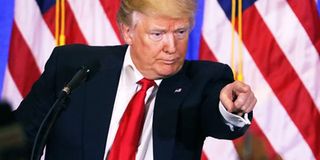Trump does not realise reality of China’s challenge to Pax Americana

US president Donald Trump
What you need to know:
- The Chinese economy is the main trigger of today’s international economic dynamism and President Trump’s allusions to a trade war with China are better left unsaid.
- The Chinese economy is the main trigger of today’s international economic dynamism and President Trump’s allusions to a trade war with China are better left unsaid.
China subscribed to the Westphalian nation-state type of diplomacy much later than the other major actors in the international system but has for decades benchmarked its security and diplomatic practice on hyper-sovereignty values. This writer had an opportunity and privilege to visit the Chinese Foreign Ministry in 2012 and hearing China’s foreign policy best practices from Chinese Officials themselves. Triangulation with further academic research leads me to the following reflections.
According to Chinese strategists and diplomats territorial self-defence is a ‘vital interest’. The use of force against Taiwan which the US would regard as aggressive might be seen by the People’s Republic of China as defensive because it involves territorial integrity. For Chinese policy-makers, the United States’ concept of ‘shaping, responding and preparing’ to the international environment as well as to ‘the full spectrum of crises’ while ‘preparing for an uncertain future’, is viewed by Beijing as an aggressive attempt at preserving ‘US hegemony’. China’s recent military brandishments in the Taiwan Straits and the South China Sea are seen as legitimate by the Chinese government.
President Richard Nixon’s (the first American president to visit China) statement known as the Shangai Communiqué issued in 1972 defined US policy toward China and Taiwan. It stated that “the United States acknowledges that all Chinese on either side of the Taiwan Strait maintain there is but one China and that Taiwan is part of China. The United States does not challenge that position. It reaffirms its interest in a peaceful settlement of the Taiwan question by the Chinese themselves”. A departure from it by the new US President Donald Trump is perceived by Beijing as revision of that position which has been maintained by all Trumps’ most recent predecessors. For sure he has crossed Beijing’s red line.
When asked what he would request from Mr Trump if he had the opportunity, his supporter interviewed on BBC World service recently who confessed to voting for him replied that he would request the new president to be careful before making any policy statement. A stiff upper lip of sorts, huh? Or shouldn’t Trump emulate former British Prime Minister Harold MacMillan aka ‘supermac’ who when challenged in the House of Commons over statements alleged to be peremptory replied, ‘I make my decisions after considerable discussion’; implying that he consulted widely before uttering any policy-implication statement. Incidentally, MacMillan was nicknamed ‘supermac’ because of his advocacy for a ‘super cabinet’ whose optimum size he maintained had to be 21 members only.
Anyhow, Beijing’s recent strategic choices indicate that China is pursuing a different approach to hitherto practised great-power politics. Chinese experience with and perception of globalisation reveal that globalisation has in fact enhanced its status quo orientation despite US hegemony which the steady rise of China’s international and regional status has eroded through not only Cooperative Diplomacy but also international economic prowess. China’s growing constructive involvement in the international system which both the US and EU had welcomed before Mr Trump threw a spanner in the works a few days to his inauguration is to the detriment of world order is at risk of being stalled.
China’s international significance is underpinned by its rapidly growing economy and integration with the international economy. The Chinese economy is the main trigger of today’s international economic dynamism and President Trump’s allusions to a trade war with China are better left unsaid.
The Chinese economy whose growth is driven by millions of Chinese consumers inside China as well as its spectacular trade and investment in the Third World exerts an important and growing influence on world trade but Trump does not seem to realise the reality of China’s challenge to Pax Americana and the old-fashioned mercantilist approach to US-Sino trade relations is likely to have a boomerang effect on his country’s trade relations with the rest of the world.
Mr Baligidde is a former diplomat.




